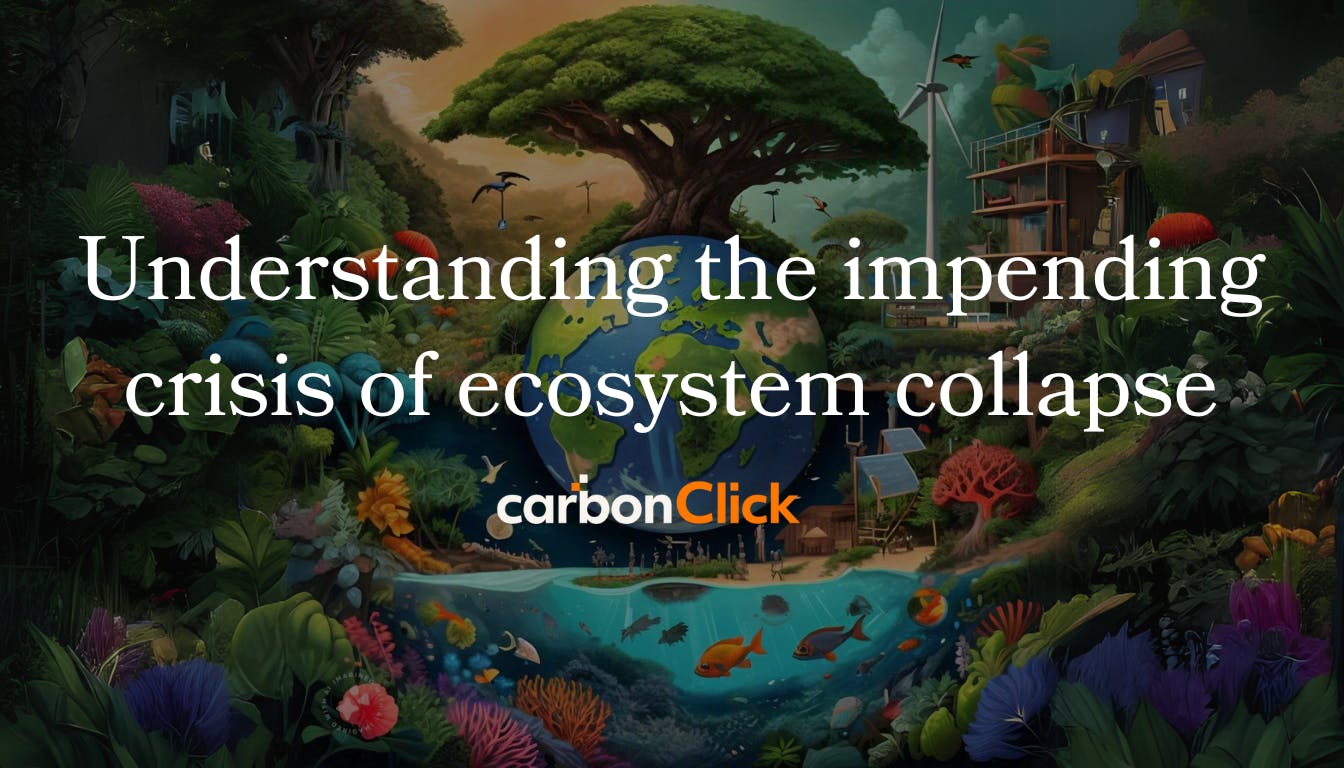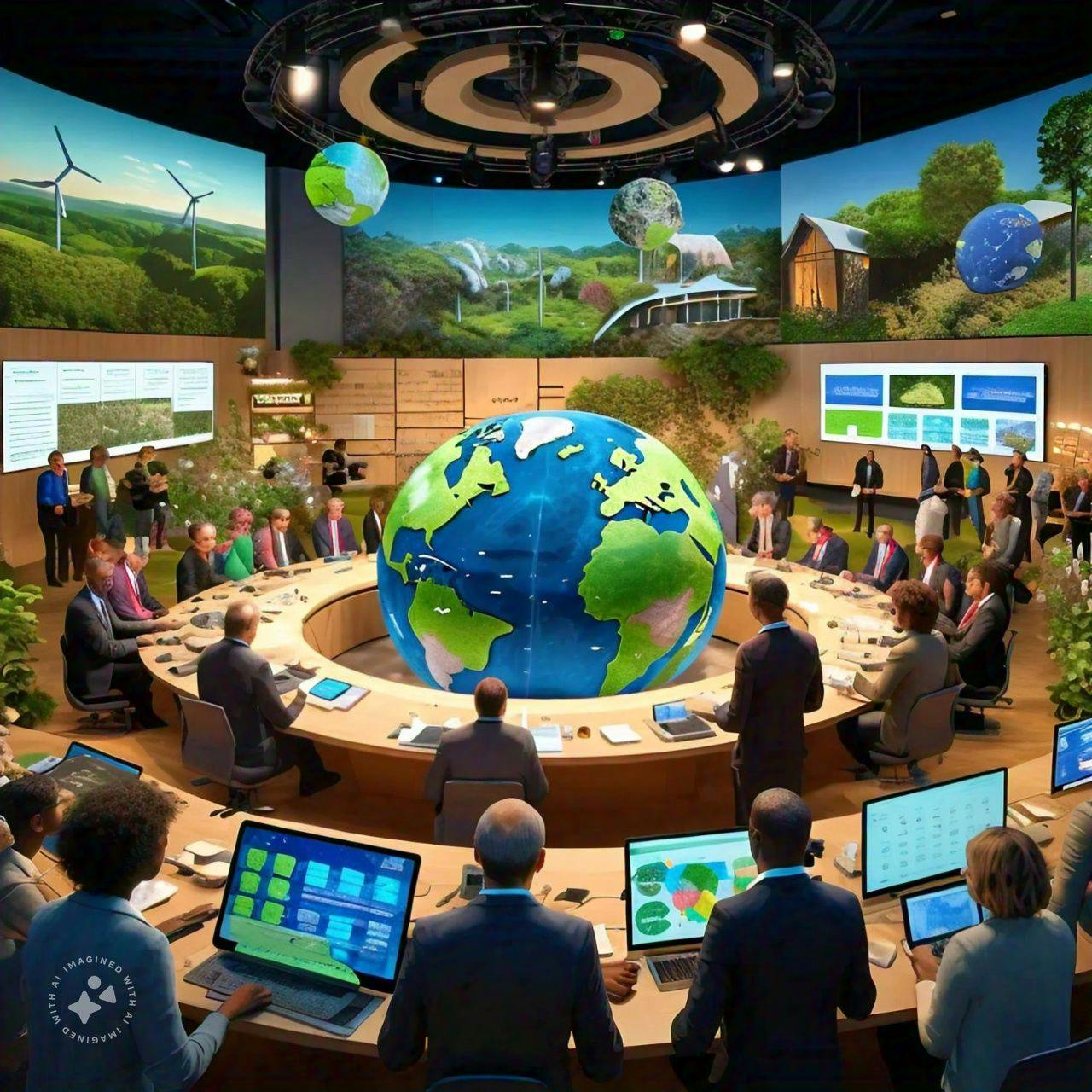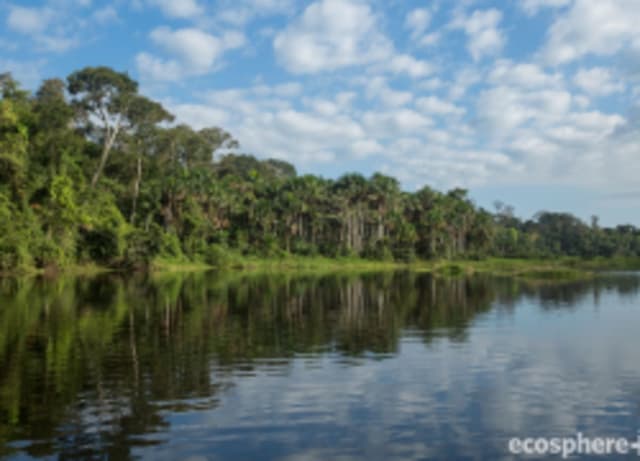Go the extra mile
Towards a cooler planet
Understanding the impending crisis of ecosystem collapse
2 November 2022
The world stands on the precipice of an unprecedented environmental crisis, characterised by the looming threat of ecosystem collapse. This situation is not just an isolated issue; it encompasses a multitude of interconnected challenges that impact biodiversity, climate stability, and overall human survival. As various geopolitical tensions rise and economic instability looms, the urgency to confront these environmental challenges becomes paramount.
Recent reports indicate that the repercussions of climate change and biodiversity loss are not merely theoretical or distant possibilities; they are immediate realities. The signs of distress in our ecosystems are already evident, with significant losses in species populations and drastic alterations in weather patterns. To comprehend the gravity of this situation, it's essential to explore the multi-faceted dimensions of ecosystem collapse, the driving forces behind it, and potential pathways towards a more sustainable future.
The concept of planetary boundaries offers a framework for understanding the limits within which humanity can safely operate. Research identifies nine critical boundaries, including climate change, biosphere integrity, and biogeochemical cycles. Crossing these boundaries poses severe risks to human well-being, threatening essential services that ecosystems provide. Currently, many of these boundaries are being breached, signalling a precarious trajectory that could lead to a cascade of ecological failures.

The interconnectedness of climate change and ecosystem collapse
At the centre of ecosystem collapse lies climate change, one of the greatest challenges currently faced. Rising temperatures, shifting precipitation patterns, and extreme weather events disrupt habitats and species distributions. These climatic changes do not occur in isolation; rather, they interconnect with other environmental stressors, compounding their effects. For instance, habitat degradation through deforestation and urbanisation exacerbates the impacts of climate change, leading to increased vulnerabilities for various species and ecosystems.
The scientific consensus indicates that to limit global warming below 1.5 degrees Celsius, we must achieve a staggering 45% reduction in greenhouse gas emissions by 2030. Yet, current trajectories suggest that emissions continue to rise, thwarting these critical goals. The consequences of failing to meet these targets are severe: scenarios predict far-reaching effects, ranging from widespread flooding and droughts to massive displacement of populations, leading to humanitarian crises.
Understanding these dynamics requires recognising the vital role that ecological systems play in regulating climate. The loss of biodiversity diminishes ecosystems' ability to sequester carbon, further aggravating climate change. Diverse ecosystems, particularly forests and oceans, act as natural carbon sinks. Thus, preserving biodiversity is not merely an environmental necessity; it is integral to stabilising our climate.

The role of Biodiversity in ecosystem stability
Biodiversity is the backbone of healthy ecosystems, influencing resilience and recovery mechanisms in the face of environmental stressors. The alarming statistic that terrestrial wildlife populations have decreased by 60% over recent decades paints a dire picture. This loss undermines the capacity of ecosystems to provide essential services such as pollination, water purification, and climate regulation.
Moreover, a decline in species diversity can lead to imbalances within ecosystems. For instance, the extinction of a single keystone species can trigger a domino effect, impacting multiple other species and disrupting food webs. Such disruptions often result in diminished ecosystem functions and reduced biological productivity, creating a vicious cycle that accelerates degradation.
In this context, biosphere integrity emerges as a critical planetary boundary. It encompasses not only species diversity but also the health of ecosystems themselves. The degradation of habitats through pollution, land-use changes, and overexploitation poses significant risks to biodiversity. The lack of a cohesive strategy to address these issues exacerbates the challenges, as efforts to lessen climate change often operate in silos, disconnected from biodiversity initiatives.
Economic systems and their impact on Nature
The current economic paradigms often neglect the intrinsic value of natural ecosystems, treating them as expendable resources rather than essential components of human well-being. The prevailing model prioritises short-term gains over long-term sustainability, resulting in glaring inefficiencies and devastating ecological consequences. For instance, the exploitation of natural resources without regard for ecological limits leads to habitat destruction and loss of biodiversity.
To tackle these issues effectively, a holistic rethinking of our economic systems is necessary. A nature-based economy presents a promising framework, proposing to integrate ecological health into economic decision-making processes. By valuing the services provided by ecosystems, this approach aims to foster a symbiotic relationship between economic activities and nature.
One intriguing possibility is the development of nature-backed currencies, which tie financial systems to ecological health. Such a model would ensure that economic growth does not surpass the capacity of natural systems. For example, limiting the creation of nature-backed currency to the amount of carbon sequestered by ecosystems could help maintain ecological equilibrium while encouraging sustainable practices.
Collectively, these strategies necessitate a comprehensive reevaluation of how value is created and measured within economies. Transitioning to a sustainable model will inevitably face challenges, but the rewards of establishing a symbiotic relationship between economies and ecosystems could yield invaluable benefits for future generations.


The call for collaborative global action
Addressing the impending crisis of ecosystem collapse requires a collaborative, global response. The interconnected nature of environmental challenges underscores the need for collective action across countries and sectors. The consequences of inaction extend beyond borders, affecting global stability, human rights, and economic systems.
International frameworks, such as the Paris Agreement, play a pivotal role in fostering global cooperation towards common goals. However, the current pace of progress remains insufficient. Countries must not only commit to ambitious climate targets but also prioritise biodiversity conservation in tandem with climate action. This holistic approach acknowledges the intrinsic link between climate stability and ecosystem health, reinforcing the necessity for integrated solutions.
Furthermore, public awareness and engagement are crucial in driving meaningful change. Individuals, communities, and organisations must be informed and empowered to participate actively in conservation efforts and sustainable practices. Initiatives that promote education, community involvement, and sustainable livelihoods can help cultivate a culture of stewardship for the planet.
The importance of scientific research and innovation
Scientific research serves as the backbone of informed decision-making in environmental policy and practice. Ongoing studies contribute to a deeper understanding of the complexities of ecosystems, climate change, and the interrelationships between various environmental factors. Furthermore, innovation in technology and practices can provide practical solutions to reduce ecological deterioration.
For example, advancements in renewable energy technologies offer a viable path towards reducing greenhouse gas emissions, thereby lessening the impact of climate change on ecosystems. Similarly, research into sustainable agricultural practices can help minimise habitat destruction and soil degradation, fostering healthier ecosystems while meeting the growing demand for food.
Investment in scientific research is essential for devising effective strategies to navigate the challenges posed by ecosystem collapse. By fostering interdisciplinary collaboration among scientists, policymakers, and communities, we can develop comprehensive solutions that address the multifaceted nature of environmental issues.

Conclusion: Pathways to resilience
The looming threat of ecosystem collapse presents an urgent call to action. The interconnected challenges posed by climate change, biodiversity loss, and unsustainable economic systems demand a coordinated response. By rethinking how we value and engage with nature, we can pave the way towards a sustainable future.
Transitioning to a nature-backed economy, prioritising global collaboration, and fostering public engagement are crucial steps in this journey. While the path ahead may be fraught with challenges, the rewards of creating resilient ecosystems and sustainable economies will benefit both humanity and the planet. The time to act is now, as the choices we make today will shape the world for generations to come.
For more in-depth reading on ecosystem collapse and potential solutions, explore resources from Single Earth and other pertinent articles on climate change and biodiversity initiatives.
17 South Street
Auckland 1010
New Zealand
info@carbonclick.com- -
- X
Sign up. Be inspired. Get clicking.
Subscribe now to stay up to date with CarbonClick, carbon offsetting and climate action.
By signing up you agree to our Privacy Policy.


